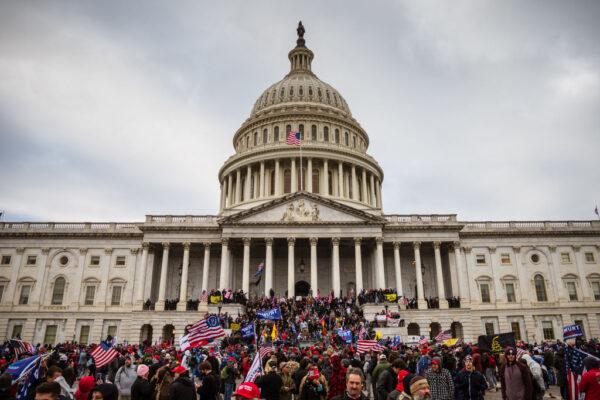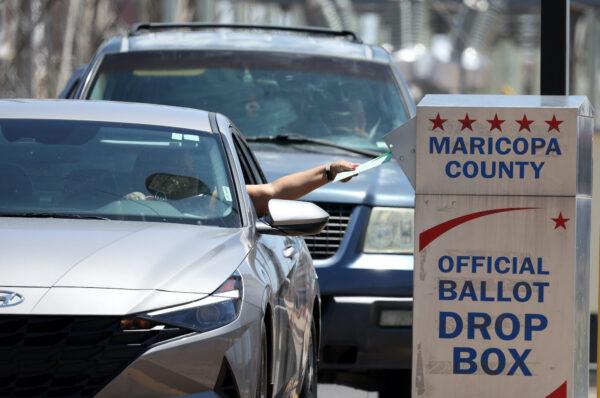U.S. cybersecurity chief Jen Easterly said the Cybersecurity and Infrastructure Security Agency (CISA) does “not censor information,” and voters should expect “normal” errors and glitches, such as burst water pipes, during the midterm elections next week.
“We don’t work with the platforms on what they do around content. That is entirely their decision. It is their terms of service. And I want to be very clear about this: We do not censor information.”
“I want to be very clear,” she added with emphasis. “We do not censor anything. What social media platforms do, what the news does, is entirely their decision.”
CISA, which sits within the Department of Homeland Security, was set up in 2018 to “understand, manage, and reduce risk” to the critical cyber and physical infrastructure Americans rely on every day, Easterly said. This includes election infrastructure.

Errors, Glitches, Burst Water Pipes Are ‘Normal’ in Elections: Easterly
The cybersecurity chief said voters should expect errors and glitches in the upcoming midterms, which she insisted were normal. As such, she said election officials asked her to pass on a message to Americans.“There are going to be errors. There are going to be glitches. That happens in every election. But that’s why there are multiple layers of security controls and resilience built into the system,” she said.
“These things are going to happen ... somebody will forget their key to the polling place, a water pipe will burst ... [These] are normal things. They’re not nefarious,” she added.
Election officials sometimes face physical intimidation as a result of misinformation about election integrity spread by foreign bad actors, Easterly said.

While this makes misinformation and disinformation an ongoing concern for CISA, Easterly said the agency saw no “credible or specific” information about efforts to “disrupt or compromise” election infrastructure this year.
However, she said there continue to be efforts by “foreign adversaries to sow discord among the American people, to undermine confidence in the integration of our elections, and to incite violence against election officials.”
“It’s a significant concern because you think about these adversaries that are trying to sow discord, that are trying to break us apart, about Americans that are trying to undermine, you know, integrity in our elections,” she said.
“We are very concerned about this,” she added.
Lawsuit Alleges CISA ‘Directed Censorship’
Easterly is one of several key officials in President Joe Biden’s administration ordered to testify under oath in a deposition about their roles in a case alleging collusion between the federal government and Big Tech companies to censor users.CISA, which sits within the Department of Homeland Security, is accused of “directly flagging misinformation to social-media companies for censorship.”
Further, Easterly is accused of claiming that speech on social media is a form of “infrastructure” which therefore falls within “her agency’s mission to protect ‘infrastructure.’” Easterly is quoted in the court filing as claiming that “the most critical infrastructure is a cognitive infrastructure.”
The lawsuit also notes text messages between Easterly and a former CISA agent, Matt Masterson, who now works at a social media platform, which ultimately centers around how Easterly allegedly “seeks greater censorship and that this would be done by federal pressure on social media platforms to increase censorship.”
Need for Depositions ‘Outweigh’ Burden
Former White House press secretary Jen Psaki and Dr. Anthony Fauci, the director of the National Institute of Allergies and Infectious Diseases and Biden’s chief medical adviser, are among the other officials ordered to be deposed.The White House has sought to block most depositions but not Fauci’s.
Lawyers for the government officials have argued in a motion filed on Oct. 27 that plaintiffs shouldn’t be able to depose Easterly; Surgeon General Vivek Murthy, a Biden appointee; and Rob Flaherty, a deputy assistant to the president.
The plaintiffs assert that Easterly must be deposed because she has “unique knowledge about the scope and nature of communications between CISA, DHS, and other federal officials,” according to a court filing.
They further assert she needs to be deposed because CISA disclosed extensive oral communications and meetings between CISA officials and social media platforms, and plaintiffs believe that as director of the agency, Easterly would have detailed knowledge of what CISA is disclosing.
When the judge originally ordered Easterly to be deposed, he found that any burden imposed on her is “outweighed by the need to determine whether the First Amendment right of free speech was suppressed.”





